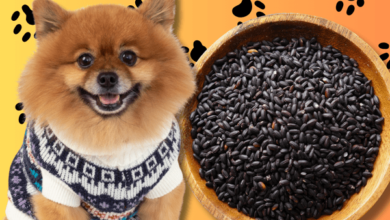
Can Dogs Eat Grits? Grits are a dish made from ground corn, typically served as a creamy, porridge-like food. They are a staple in Southern cuisine and are often cooked with butter, cheese, and seasonings to enhance their flavor. Grits come in different varieties, including quick-cooking, instant, and stone-ground, each offering a unique texture and cooking time.
If you’re considering sharing grits with your dog, it’s important to understand how they might affect your pet. In this guide, we’ll explore whether grits are safe for dogs and the best way to offer them as an occasional treat. Let’s briefly discuss that- Can Dogs Eat Grits?
Are Grits Safe for Dogs to Eat?
When it comes to sharing your favorite Southern dish with your furry friend, you might wonder, Can dogs eat grits? The answer depends on how the grits are prepared. Let’s take a closer look.
Plain Grits: A Safe Option in Small Amounts
- Plain, cooked grits are generally safe for dogs in moderation.
- They don’t contain harmful ingredients like butter or cheese.
- Keep portions small since grits are high in carbohydrates, which can lead to weight gain if overfed.
Seasoned Grits: Not Dog-Friendly
- Grits flavored with butter, salt, cheese, or garlic should never be given to dogs.
- These additives can upset your dog’s stomach or cause more serious health issues.
- Stick to unseasoned grits to avoid unnecessary risks.
Should Grits Be a Regular Part of a Dog’s Diet?
- Grits are not a balanced food for dogs and lack essential nutrients.
- They can be an occasional treat but shouldn’t replace your dog’s regular diet.
- Always consult your vet if you’re unsure about adding grits or any new food to your dog’s menu.
By sticking to plain grits in small amounts, you can safely share this classic dish with your dog once in a while. Always prioritize your pup’s health when deciding on treats!
Nutritional Value of Grits for Dogs
If you’re wondering, Can dogs eat grits? It’s important to understand the nutritional value of this popular dish. While grits might seem harmless, they don’t offer much that’s beneficial for dogs. Here’s a breakdown of what grits provide and what they lack.
High in Carbohydrates
- Grits are packed with carbs, which give your dog a quick energy boost.
- Too many carbs, however, can lead to weight gain and other health problems.
- Dogs don’t need a carb-heavy diet, so grits should only be given in small amounts.
Low in Protein
- Dogs rely on protein for strong muscles and healthy growth, and grits don’t deliver much of it.
- A diet low in protein can affect your dog’s overall health over time.
- For a healthier option, stick to foods that are rich in high-quality protein.
Lacking Essential Nutrients
- Grits don’t have the vitamins and minerals your dog needs for a balanced diet.
- They don’t provide nutrients like calcium, omega-3 fatty acids, or vitamins A and D.
- Relying on grits as a treat doesn’t add much value to your dog’s nutrition.
While plain grits can be a safe occasional treat, they don’t offer the nutrients your dog needs to thrive. Always ensure your pup’s diet includes the right balance of protein, fats, and essential vitamins.
Health Risks of Feeding Grits to Dogs
While grits might seem like a harmless treat, they can pose several health risks for your furry friend. Before sharing, it’s important to know how grits can affect your dog’s health.
Obesity
- Grits are high in carbs, which can lead to weight gain if fed in large amounts or too often.
- Overweight dogs may face issues like joint pain, reduced mobility, and heart problems.
- Keeping treats like grits occasionally helps maintain a healthy weight.
Digestive Problems
- Grits are often prepared with butter, cheese, or salt, which can upset your dog’s stomach.
- These additives might cause diarrhea, vomiting, or general discomfort.
- Stick to plain, cooked grits if you choose to offer any at all.
Allergic Reactions
- Some dogs are allergic to corn, the main ingredient in grits.
- Allergies can show up as skin irritation, itching, or digestive problems like diarrhea.
- Monitor your dog after feeding grits for any signs of an allergic reaction.
When asking, Can dogs eat grits, remember that while plain grits in small amounts may be safe, they should never replace a balanced diet. Keep your dog’s health in mind and avoid flavored or seasoned grits entirely.
How to Safely Serve Grits to Your Dog
If you decide to let your dog try grits, it’s important to prepare and serve them carefully. Here are some tips to make sure grits are safe for your dog.
Cook Plain Grits
- Always cook grits using plain water. Avoid using butter, salt, cheese, or other seasonings.
- Seasoned or flavored grits can harm your dog and lead to digestive problems.
- Keep it simple to reduce any potential risks.
Limit Portions
- Serve only a small portion of cooked grits, such as a teaspoon or two, depending on your dog’s size.
- Too much can cause weight gain due to the high carbohydrate content.
- Treat grits as an occasional snack, not a regular part of your dog’s meals.
Monitor for Issues
- Watch for signs of an allergic reaction, such as itching, skin redness, or digestive issues.
- If your dog seems uncomfortable or shows symptoms like vomiting or diarrhea, avoid giving grits in the future.
- Contact your vet if any severe reactions occur.
When asking Can dogs eat grits, remember that plain, cooked grits in moderation may be safe, but always prioritize your dog’s overall health and dietary needs.
Alternatives to Grits for Your Dog
If you’re wondering about better options than grits for your dog, there are healthier alternatives that provide more nutritional benefits. These options are safe, easy to prepare, and gentle on your dog’s digestive system.
Sweet Potatoes
- A natural, fiber-rich alternative that supports healthy digestion.
- Serve cooked and plain, without added butter, sugar, or seasonings.
- Packed with vitamins like A and C, making it a nutritious treat.
Rice
- A great option for dogs with sensitive stomachs or digestive issues.
- Choose plain, cooked white or brown rice without salt or spices.
- Light and easy to digest, rice can be a soothing choice for your pup.
Oatmeal
- High in fiber and essential nutrients, oatmeal is a great occasional treat.
- Serve cooked and plain, avoiding any added sugar or flavorings.
- Supports healthy digestion and provides long-lasting energy.
When deciding Can dogs eat grits, consider these alternatives. Sweet potatoes, rice, and oatmeal are healthier choices that meet your dog’s nutritional needs more effectively.




